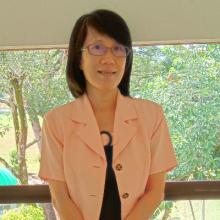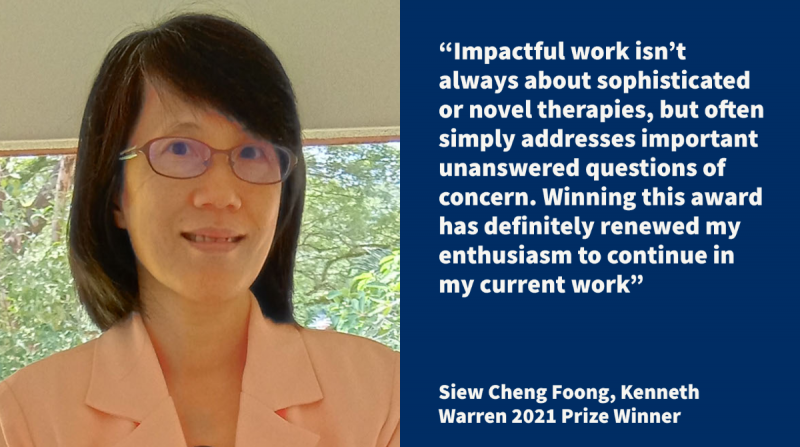
Every year Cochrane recognizes the outstanding work of Kenneth Warren, a scientist, extremely influential in drawing attention to the 'great neglected diseases' that plague people in developing countries. He prioritized the need for valid summaries of key research studies and to the way electronic media could be used to disseminate results of health research.
Kenneth was an enthusiastic supporter of the pilot work in pregnancy and childbirth that led to the creation of The Cochrane Collaboration, and, with Fred Mosteller, he co-organized the meeting at the New York Academy of Sciences at which the vision for Cochrane was first made public.
The Kenneth Warren Prize is awarded every year by Cochrane to a scientist who publishes a Cochrane Review about a health issue in developing countries. The winning entry judged to be both of high methodological quality and relevant to health problems in low income countries.
2021’s winner is Siew Cheng Foong, for "Oral galactagogues (natural therapies or drugs) for increasing breast milk production in mothers of non‐hospitalised term infants"
How did it feel winning the prize?
Surreal! I initially couldn’t believe that I actually won a prize! We believed that our review would have world-wide impact, particularly in the low resource world but to have this formally recognized is both humbling and gratifying. And to be receiving a prize for pursuing answers to a question that people needed information on is truly rewarding. Credit goes to the passion and dedication of the whole author team.
How did you first find out about Cochrane, and indeed the Kenneth Warren Prize?
Professor Jackie Ho, who has also been honoured this year, was the person who encouraged me to become involved with Cochrane. As for the Kenneth Warren prize, I learnt about it at a Cochrane colloquium but had always regarded it as a really prestigious prize that was beyond my reach.
What’s been the impact of winning the prize to you, and your work?
All I had set out to do was to find answers for something that had happened to me as a mother —low milk supply. Milk boosters (galactagogues) are commonly suggested as a solution across the Asian continent, but as a doctor, I looked for evidence…. only to find that little existed to support such remedies. That’s what compelled me to tackle this project… not only for myself, but for all mothers around the world struggling with low milk supply, and for their health care providers who are called upon to provide evidence-based guidance on increasing breast milk production.

On reflection, I am realizing that impactful work isn’t always about sophisticated or novel therapies, but often simply addresses important unanswered questions of concern. Winning this award has definitely renewed my enthusiasm to continue in my current work— to help support and improve the health and mental well-being of both the mother and baby through breastfeeding as well as kangaroo care. These early experiences have huge impacts on health outcomes, particularly in low resource communities.
Finally, how important is this prize, its heritage, and prestige in promoting Cochrane and evidence based health care?
Kenneth Warren understood the importance of evidence-based medicine and prioritized the need to disseminate the results of health research to low resource communities. I believe the Kenneth Warren prize reminds everyone of the work that Cochrane does as it highlights the best of each year’s reviews. It also reminds us that Cochrane reviews represent a wide range of people and communities and Cochrane needs to continue to meet the needs of people in the low resource world.
Winning the prize put our review in the spotlight. This could bring attention to key points of our review, which were the identification of issues with how studies on galactagogues are currently conducted and the provision of recommendations for the improvement of future research studies. These in turn should improve the certainty of findings of future reviews. This is a critical step towards providing stronger evidence-based guidance on the use of galactogogues for improving milk production, something that is currently severely lacking.
As I write, news of how our “Oral galactagogues (natural therapies or drugs) for increasing breast milk production in mothers of non‐hospitalised term infants” won the Kenneth Warren prize is spreading over the local social media and appearing in the news bulletin of our local medical association. This is attracting new readers to the review and increasing awareness about the importance of looking for evidence for commonly used remedies in one’s local area. And a bonus: Malaysian health care providers and our community are learning about the vital role that Cochrane plays in bringing evidence for problems relevant to everyday lives, while breastfeeding advocacy groups and peer counsellors from nonhealthcare backgrounds are becoming aware of the existence and availability of this evidence for their work—a win for everyone.

